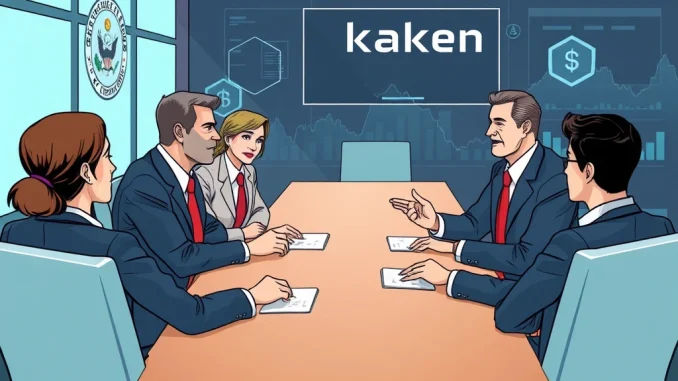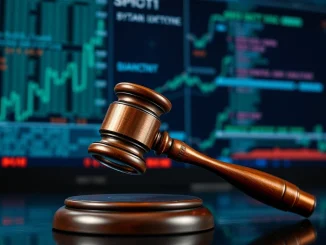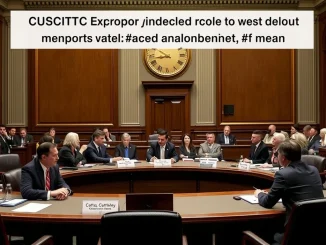
The landscape of digital asset regulation in the United States is constantly evolving, and a recent development has captured the attention of the crypto community. A significant SEC Kraken Meeting has taken place, bringing together representatives from the U.S. Securities and Exchange Commission’s (SEC) Cryptocurrency Task Force and Payward, Inc., the company operating the global crypto exchange Kraken. This meeting focused on two pivotal areas: the tokenization of traditional assets and cryptocurrency staking services.
What Was Discussed at the SEC Kraken Meeting?
According to a report by Solid Intel shared via X, the core agenda items for the meeting were:
- Tokenization of Traditional Assets: Exploring how real-world assets like real estate, art, or commodities can be represented as digital tokens on a blockchain. This involves understanding the technology, potential benefits, and, crucially, the regulatory implications of creating and trading these tokenized assets.
- Staking Services: Discussing the mechanisms and regulatory status of services that allow users to earn rewards by holding and ‘staking’ their cryptocurrencies to support network operations. This is a particularly sensitive topic given the SEC’s past actions concerning staking programs offered by exchanges.
This engagement between a major regulator and a prominent exchange highlights the SEC’s active interest in these specific facets of the digital asset market.
Why is Crypto Staking Regulation a Hot Topic?
Crypto Staking Regulation has been a significant point of contention between the SEC and the crypto industry. Staking allows participants to earn passive income by locking up their crypto holdings to help validate transactions on proof-of-stake blockchains. While proponents see it as a fundamental network function, the SEC has, in some cases, viewed staking-as-a-service offerings by platforms as potentially unregistered securities contracts.
The core debate often revolves around the ‘Howey Test,’ a framework used to determine if something qualifies as an investment contract and thus a security. The SEC argues that when platforms pool user assets, manage the staking process, and offer returns, it can meet the criteria of an investment contract, requiring registration and compliance with securities laws.
For Kraken specifically, this discussion is highly relevant. The exchange previously settled with the SEC over allegations that its staking-as-a-service program constituted an unregistered securities offering. The settlement involved Kraken discontinuing the program for U.S. customers and paying a fine. Therefore, any discussion about staking likely touches upon the path forward for offering such services in a compliant manner, or perhaps the regulatory nuances between different types of staking activities.
Exploring the Potential of Tokenization of Assets
Beyond staking, the meeting delved into the Tokenization of Assets. This concept involves issuing digital tokens on a blockchain that represent ownership or rights to underlying assets. These assets can be diverse, ranging from illiquid items like real estate or private company equity to more liquid ones like bonds or commodities.
The appeal of tokenization lies in its potential to:
- Increase liquidity for traditionally illiquid assets.
- Enable fractional ownership, making high-value assets accessible to more investors.
- Improve transparency and efficiency in transactions through blockchain technology.
- Potentially lower transaction costs.
However, tokenization also raises complex regulatory questions. How do existing securities laws apply when a share of stock or a piece of real estate is represented as a digital token? Are these tokens inherently securities? What are the obligations of platforms that facilitate the issuance, trading, and custody of these tokenized assets? The SEC’s interest suggests they are actively exploring how to apply or adapt existing frameworks to this emerging market segment.
What Does This Mean for US Crypto Policy and Kraken SEC Relations?
This specific Kraken SEC interaction is a microcosm of the broader dialogue shaping US Crypto Policy. The SEC, as the primary regulator of securities markets, is grappling with how to oversee a rapidly evolving technology that blurs the lines between traditional finance and new digital paradigms.
Meetings like this are crucial for both regulators and industry participants. They provide an opportunity for the SEC to gather information directly from market operators about the practicalities and innovations within the space. For Kraken and other firms, they offer a chance to understand the SEC’s concerns, potentially clarify their business models, and advocate for clear, workable regulatory guidelines.
While the specifics of the discussion are not fully public beyond the reported topics, the fact that the SEC’s dedicated crypto task force is engaging directly with major platforms on specific technologies like tokenization and staking indicates a targeted approach to understanding and potentially regulating these areas. This could foreshadow future guidance, enforcement actions, or even contribute to legislative discussions surrounding digital assets.
Challenges and the Path Forward
The path to clear US Crypto Policy is fraught with challenges. Regulators face the difficult task of protecting investors and ensuring market integrity without stifling innovation. The industry, meanwhile, seeks clarity and predictable rules to build and operate within the United States.
Key challenges include:
- Defining which digital assets or services fall under existing securities laws.
- Jurisdictional overlaps between different regulatory bodies (SEC, CFTC, etc.).
- Developing rules that are flexible enough for technological advancements but robust enough for consumer protection.
- Ensuring global competitiveness for U.S. firms in the digital asset space.
The outcome of discussions like the recent SEC Kraken Meeting will play a role in navigating these challenges. Continued dialogue, perhaps leading to clearer frameworks or rules tailored to digital assets, is essential for the maturation of the U.S. crypto market.
Conclusion: A Sign of Things to Come?
The recent engagement between the SEC and Kraken on the critical topics of Tokenization of Assets and Crypto Staking Regulation is more than just a routine meeting; it’s a significant indicator of where U.S. regulators are focusing their attention within the digital asset space. For firms like Kraken and the broader industry, these discussions are vital in shaping future operations and compliance strategies. As the conversation around US Crypto Policy continues to evolve, meetings like the SEC Kraken Meeting underscore the ongoing effort to integrate novel technologies into existing or new regulatory structures. Market participants should stay informed about these developments, as they directly impact the operational environment for crypto businesses and the available services for users and investors.



